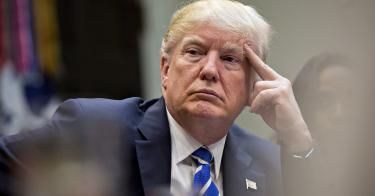The French want the U.S. to join a global pact to hike taxes. Uncle Sam shouldn’t play along.
The Organization for Economic Cooperation and Development (OECD) has proposed removing restrictions keeping governments from taxing foreign-owned businesses that have only a limited presence in their country.
The OECD’s proposed rule changes face an uphill battle to win support. So, to “persuade” the U.S. into helping make the new OECD framework a reality. Paris is threatening to tax U.S. digital service providers like Google and Facebook. In response, the U.S. has threatened tariffs of up to 100 percent on $2.4 billion of French cheese, champagne, and other exports.
The French and the U.S recently agreed to stand down as they work toward an OECD-led global solution. President Trump shouldn’t let the French-led European coalition bully the U.S. into the OECD framework.
International tax rules currently protect businesses from being taxed by countries in which they don’t physically operate. If a business doesn’t have people or things—factories, warehouses, etc.—in the country, they shouldn't be subject to taxes there.
Each country is also able to set its own tax rates, creating international pressure to keep taxes from getting too high. If tax burdens do get too high, businesses can move.
Tax competition protects consumers and workers from high taxes that decrease innovation and lower wages.
The current system is certainly not perfect, but these two features are crucial constraints on government’s power to tax.
The OECD’s two-pronged proposal works to overturn both critical protections in the current system by taxing some international profits based on their consumers’ location rather than the businesses’ and advancing a new global minimum tax to slow the taxpayer-friendly pressures of tax competition.
The OECD proposal is simply a rebranded continuation of the drive to increase global taxes that began more than three decades ago. The OECD’s original reports were clear in their motivation. They worried that the tax competition from businesses' ability to choose the best country to do business in could make it more difficult to increase progressive taxes and hamper “the achievement of redistributive goals” The competitive tax codes of the U.S., Ireland or the Bahamas, for example, threaten the high tax, big-spending governments of Europe.
Since the 1990s, the OECD has worked to increase the power of international tax collectors and diminish the ability of individual countries to set their own tax rules. Until now, they have been relatively unsuccessful.
Not all coordination is bad. The OECD has led a cooperative effort to reduce double taxation of profits—a move that benefits trade and increases tax fairness. But attempting to eliminate economic competition between tax systems, turns international coordination into international cartelization.
International businesses and economic advisors fear that digital taxes, like the one threatened in France, will proliferate around the world if a global solution to raise taxes on online businesses is not found.
They are right to worry. Unilateral digital taxes are certainly bad economic policy. Similar to a tariff on 21st-century digital goods, the costs are highest for domestic businesses and consumers. Amazon, for example, said they will pass the cost of the tax on to third-party French sellers.
But instead of working in good faith, European countries are using the threat of these new and economically destructive taxes on U.S. business activity to coerce the U.S. to be part of the OECD plan to rewrite the international corporate income tax rules.
If the French succeed at bullying President Trump and Secretary Mnuchin into embracing these new rules, the higher taxes levied by foreign governments on American and other international businesses will hurt workers and consumers.
Contrary to the OECD’s stated goal to stabilize the international tax system, abandoning the core taxpayer protection that links physical location and tax liabilities, will only further destabilize and increase uncertainty about global tax norms.
The U.S. should refuse to participate in any process to abandon the physical-presence requirement for business taxation or to place arbitrary one size fits all minimum taxes on business income. Countries should be free to set tax rates as they see fit. Congress should reject any plan that delegates more power to international bureaucrats at the OECD.
If France, or any other country, wants to place new taxes or tariffs on its own citizens, they have that right. America can then explain why such a move is terrible policy and hurts the French people. But let’s not let the policy blunders of Paris scare us into a global scheme designed raise taxes at home and across the world.
This piece originally appeared in Fox News



